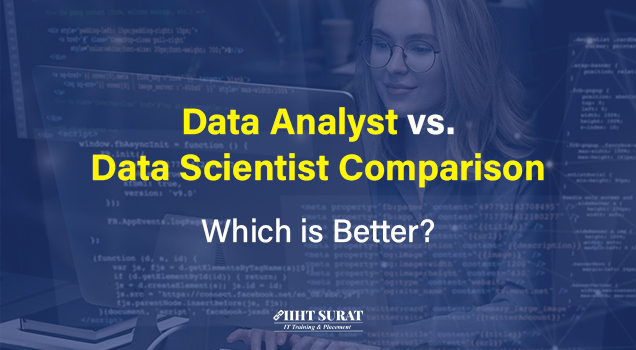Data Analyst vs. Data Scientist Comparison: Which is Better?

Table of Contents
ToggleData has become a critical resource for organisations worldwide ever since the beginning of the rapid digital world. The ability to effectively collect and analyse data can signify whether or not an organisation is making a profit in every section. This is applicable to start-ups as well as multinational corporations. There are increasing numbers of careers in data analysis and data science. These fields offer exciting pathways to individuals who have a great passion for math, computers and solving tough situations.
Role of Data Analyst & the Role of Data Scientist
Large quantities of data need to be collected, processed and subjected to statistical analysis in the role of a Data Analyst. By generating actions that can change situations and supporting business strategies, they produce insights. For instance, Data Analysts understand how to manipulate and illustrate information using tools such as SQL for database management, Python or R for data manipulation, and Tableau or Power BI for producing engaging visualisations. The duties that they perform are cleaning the datasets, finding patterns in them and presenting the results so that stakeholders can comprehend.
On the other hand, data scientists go beneath the surface to establish predictive models and algorithms that are useful for predicting future trends. They rely on their knowledge of computer science, statistics, and domain expertise to find out imperceptible trends hidden within data. Machine learning is an integral part of these specialists’ backgrounds, as they have experience in programming languages like Python and R, plus big-data applications such as Hadoop and Spark. Responding to complex decisions made by machine learning models developed alongside conducting intricate data analysis of businesses’ processes are among their tasks.
When it’s about data analytics vs data science, both these two positions have key roles in helping businesses grow and innovate by using their stored information. It is not just about analysing present facts by Data Analysts but also forecasting what will happen next supported by model-driven decisions provided by Data Scientists. Together, they make up the driving force behind turning raw corporate numbers into strategic assets.
The Key Differences between data science and data analytics
Debate about Data Analyst vs Data Scientist is based on the nature of tasks performed by each of these professionals and the scope of their duties. Data analysts are mostly concerned with using tools that visualise data and for descriptive statistics purposes. On the other hand, data scientists probe deeper into predictive as well as prescriptive analytics that address questions like “what if?” or “how to deal with it?”
Backgrounds in Education and Career Paths
Data Analysts
- Bachelor’s degree in business administration, finance, sales or maths.
- Advanced degrees or certifications in business analytics or related fields are necessary.
- Experience working in roles that involve the processing of information, such as database administrator or financial officer.
Data Scientists
- Bachelor’s degree in computer programming, statistics and data science.
- Other cases for them to pursue Master’s or PhD degrees may come up during their career pathways.
- Certifications on machine learning technologies and big data are always on their schedule.
Data science vs. data analytics : Which is Better?
1.Data Science
- Pros : It has a high demand for professionals, it pays well, and provides flexibility in an AI or machine learning space. Engaging in tasks that have an impact on the overall company’s performance.
- Cons : Steep learning curve, technical complexity and need to improve or acquire new skills all the time.
2. Data Analytics
- Pros : There is a high demand, though salaries might be moderate. Concentration solely on descriptive analytics, reporting and visualization. Unlike data science, it does not require very advanced technical skills.
- Cons : However, it may not be as versatile and may involve more routine work than what pertains to data science
3. Factors to Consider
- Educational Background : While Data Science will often call for advanced degrees and strong programming skills, Data Analytics may just need a bachelor’s degree along with statistical knowledge of some basics.
- Career Goals : Go for a Data Science Course if you relish solving intricate issues and making predictive models. Otherwise, if you would rather examine existing data, thus giving insights, then go for Data Analytics.
Career Opportunities and Salary
Which career path is best for you? Depending on your passion, strength, and future objectives, you may prefer to be a data analyst or a data scientist. As analysts mostly handle structured data while employing visualisation techniques, they earn between $60,000 and $90,000 every year. However scientists specialising in predictive modeling combined with machine learning are paid more because of their exceptional skills. This varies from around $95,000 to $165,000 annually based on their experience and industry.
The professional outlook is strong for both fields. From 2020–2030 alone, job demand for data analyst positions alone will increase by about 25%. In addition, there is a high need for data scientists in different sectors, including finance, healthcare technology, and etcetera.
Conclusion
It all begins with a strong foundation and expert guidance in the dynamic world of data analytics and data science. Well, IIHT SURAT is the right place for you if you are looking to take on an interesting career path within these fast-growing fields.
Strategically located at two centres in Surat, which have modern amenities as well as a learning conducive atmosphere that nurtures creativity and innovation, IIHT SURAT offers a holistic Data Science Course that aims at equipping you with the requisite skills and knowledge to make it big in the ever-changing technology landscape.

